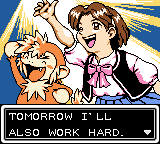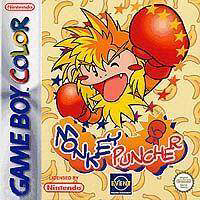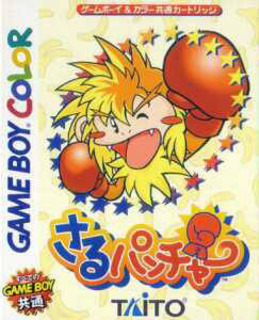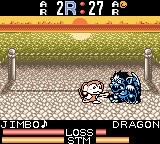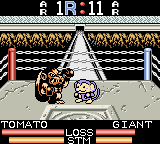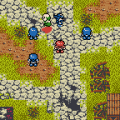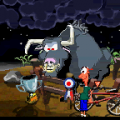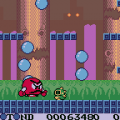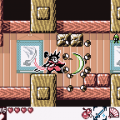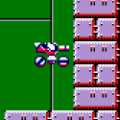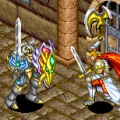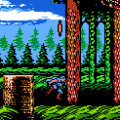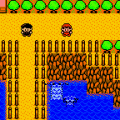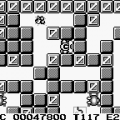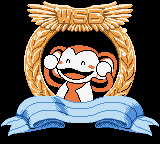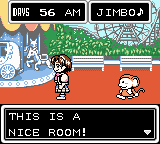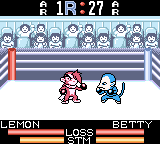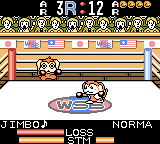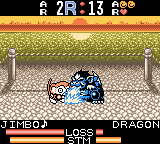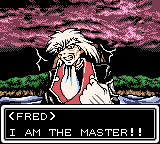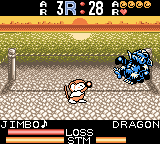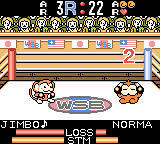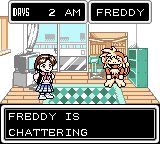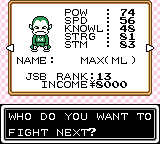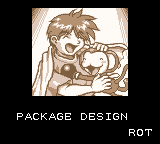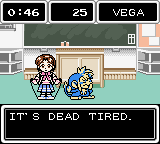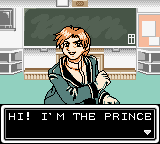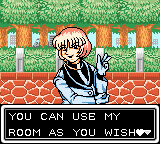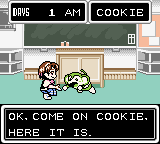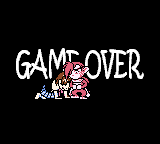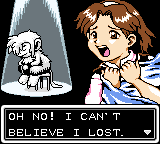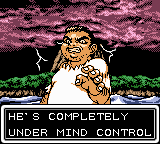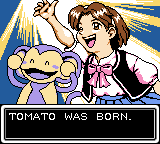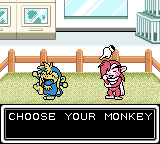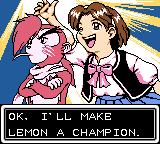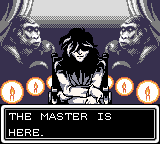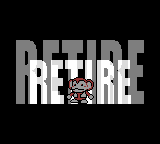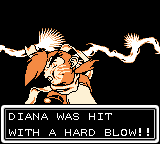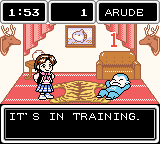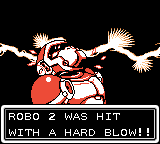The Taito developed Monkey Puncher is a part virtual pet and boxing simulation game released in the year 2000. While certainly in the running for the most peculiar title to ever grace the Game Boy Color, it serves for an apt description. You play as the child of a prolific monkey trainer, but one fateful day are thrust into the seedy underbelly of championship monkey fighting when the Saru gang kidnaps your family. To win them back, you must climb the ranks of the monkey punching leaderboards until eventually squaring off against the gang’s enigmatic leader.
Your first monkey is gifted to you by a charitable stranger by the name of Fred, and from there on the game is divided between training and fighting. Training is accomplished via simple rhythm based minigames with the player coaching the monkey to exercise and improve its stats. Minigames include jump-rope, punching, sit-ups, and jogging, which increases speed, power, strength and stamina respectively. Although “minigame” may be overselling it a bit. All the player does is tap the A button, quickly enough to interest the monkey, but not so fast the protagonist cramps up to the monkey’s derisive laughter. When done right, the monkey imitates the player, forming combos of its own that lengthen as stats continuously rise. These combos require no input from the player whatsoever, so as the duration of these workouts increase, more time is spent not interacting with the game. Needless to say, one better have a tv-show or podcast on hand for when combos approach the triple digits.
Naturally, intense exercise demands an intense appetite. You will have to feed the monkey from an assortment of snacks before, after, and during workouts. Fail to do so and it’ll become paralyzed by hunger. Though each monkey has their preferences, the expensive food always recovers the most stamina, and money is rarely an issue. When low on food you can send the monkey to town with a shopping list, but the likelihood of it following that list depends on its knowledge level. Sometimes it’ll spend money on useless garbage, but other times it will uncover rare objects! If food and money are both depleted, the game is over. The character despairs over the rough life of a monkey trainer as you are booted back to the title screen.
The monkey is conditioned through a system of positive and negative reinforcement. Praising the monkey after reaching a new record will encourage it to break even more records. Likewise, reprimanding the monkey after losing focus will shift attention back to training. Utilized effectively, the result is a more obedient monkey. The routine is the same for each pet, and thus a bit overly simplistic. On many occasions the player will be left clueless how to respond because they got bored watching a minute-long training montage. Amid all this berating, one can’t help but notice the inherent cruelty of the game’s premise. The monkeys never have a chance to “monkey around” and have fun. Perhaps the ability to play with or groom the monkey would’ve been better implemented than a half-baked behavior system. At the very least it would give the monkey’s life a little more meaning outside the ring.
Of course, all that training would be for nothing if the monkey never fought, so every three days you choose an opponent at the Monkey Boxing Association and have a match the next day. Like training, matches are passive events relegating the player to spectate and hope for the best. Between bouts you may heal or change fighting maneuvers to favor a specific stat. You can also cheat with a performance enhancing item that temporarily boosts power. Regardless of how much you train, inevitably you will lose because each monkey has a level cap. The only way to get more powerful is to breed them with other strong monkeys purchased from the monkey shop. With each newborn monkey, the level cap gets incrementally higher. Unfortunately, this means you must start from scratch each time, climbing the leaderboards a handful of times in what surely becomes an excruciatingly mind-numbing repetition.
At the very least there is a good variety of monkeys to play with. There are five types in all, each with animations unique to that species. Some of the monkeys look like anime protagonists that belong to a different game, while others look downright goofy. Each species experiences a wide range of emotions and it’s a pleasure to uncover them as you play the game. Some of the more notable animations include when feral monkeys bite the player when upset, or blush after being praised for the first time. The animations really add a personality to the game and is unquestionably the title’s most solid aspect.
As you progress, keys are awarded by NPCs or uncovered by the monkey on its trek to and from the item shop. The keys allow you to access new areas to train in, but ultimately serve as nothing more than a change in backdrop. The music also changes, but it’s still forgettable and probably long since muted. Other scavenged items include books that teach your monkey special punches to use in the final moments of a match. There are presumably nine in total but are rare enough that it’s unlikely that you’ll find all of them by credits roll. Not that the player is missing out, as they all involve the same animation, just with a different still image in the background. Mysterious scrolls appear as well, but they are exceedingly rare and of unknown use.
After winning the championship, you are invited to the Saru gang’s secret island hideout. You are challenged by an onslaught of minions that include your own brainwashed father, your brother or sister, and a robot. Once victorious the kingpin unveils himself; he was masquerading as Fred this whole time! His evil plan was to make you as strong a monkey trainer as possible so you too could be brainwashed into doing his bidding. Or something of the sort. The translation is riddled with errors, so the player is often left stitching together mangled sentences to get a general feel of whatever transpires on screen. Which to be fair, is fine considering how simplistic the story is. If anything, it makes for a quick chuckle or two as characters exclaim nonsense about monkeys to each-other in broken English. However, for a menu-based game certain quirks of the translation require an initial trial and error until you become fluent in the game’s syntax errors. For example, in your first boxing match you wouldn’t guess that telling your monkey to “beat it up” refers to prioritize defense, or that “get on your feet” means to treat your monkey’s injuries.
Monkey Puncher was released in Europe and Japan, but never made it to North America. Even upon its release, it was barely talked about. The reviews were middling at best, praising the graphics but otherwise considering it a novelty. However, it appears those that did play the game growing up have nothing but fond memories, and one could see why. The gameplay, although simple and repetitive, is charming in its inadequacies. And the premise itself is oddly delightful. After all, what other game would allow you to become the manager for a successful monkey boxing league?
